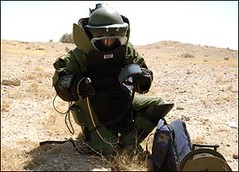By U.S. Navy Journalist 2nd Class John J. Pistone MNSTC-I Public Affairs
BASRAH, Iraq – One of the greatest threats to the security of Iraq, and a common tactic of terrorists and insurgents, is the use of improvised explosive devices and mines. According to data provided by the Multi-National Force – Iraq, the majority of the casualties suffered by both Coalition and Iraqi Security Forces have resulted form some form of explosives used in IEDs, vehicle-borne IEDs and suicide bombs. There is an additional threat in Iraq by way of minefields, cluster munitions and other explosive remnants of war.
In an ongoing effort to change this, the Iraqi Bomb Disposal School, located near Basrah, is currently training army and police personnel who are committed to combating the use of IEDs and other explosive devices.
Iraqi Army Lt. Col. Foad, the commander of the 4th Division’s Iraqi Army Bomb Disposal Company, said he believes the school is vital to the war against the insurgency. {Click on image for photo details}

1 comment:
"In order for us (Iraqis) to defeat the insurgency we have to be able to safely detect and destroy the bombs and IEDs these criminals use," Foad said with the help of an interpreter. "The future of our nation depends on us being able to stop these activities. This is why this school is important."
According to U.S. Army Maj. Donald R. Weakley, the Coalition liaison officer for the BDS, the soldiers and police officers have to endure an intensive and grueling 12-week course before getting certified as bomb disposal technicians.
"The bomb disposal field is very technical. One mistake or error in judgment could be catastrophic," Weakley said. "This is why the courses here at the school are very extensive; the students not only have to complete numerous hours of classroom work, but they have to pass several rigorous field tests as well."
Weakley said the job of bomb disposal is very time consuming and requires someone with a lot of patience.
"Some of the scenarios taught here involve clearing mine fields, clearing buildings and disabling IEDs," he said. "The tactics for successfully accomplishing these tasks require a lot of time."
To clear a mine field, building or any other area requires careful planning and a controlled, systematic approach, according to Weakley. Teams use various techniques and equipment to ensure the area being searched is cleared in a safe and accountable manner. He explained that students, for example, use an expedient marking method to identify cleared areas.
"During clearance of access routes and areas, marking is progressively positioned and deployed to ensure safety of the clearance operators and of the public," Weakley said. "This marking is sometimes in the form stones that signify the delineation between safe and un safe areas. This is not something you want to rush, and so this alone could take hours," he explained
When students find ordnance in a mine field, they stand up, raise their arm and shout "Mine," signifying to the unit commander that they have found something. The commander then makes the decision as to whether to move or destroy the ordnance.
According to Weakley, the average drop rate of the class is somewhere between 30 and 40 percent, which is comparable to the EOD school in the U.S.
He said the school offers Level III training for the Iraqi Army Bomb Disposal companies only, and consists of trauma first aid, ordnance identification, minefield and other area clearance operations and demolitions courses.
Level IV training, attended by both Iraqi soldiers and policemen, includes advanced instruction in the areas of guided weapons and air-dropped bombs, in addition to working with specialized equipment such as x-ray machines, bomb suits and remote controlled robots. Students also focus on forensics collection and blast scene analysis.
According to Weakley, all of the training is scenario-based – created from reports of actual events. As a result, students learn to treat every field exercise as if they were responding to a real event.
Iraqi Army Capt. Ziad, the executive officer of the school, said this is a very important aspect of the training.
"Our students are taught to treat every class as if they were responding to a real event so they don’t take the training lightly," Ziad said with the help of an interpreter. "Fellow Iraqis have lost their lives as a result of some of these events; our work is serious and we should be too."
Weakley said that some of the current students are being trained as instructors for future iterations.
"The majority of the current instructors are civilian contractors, but as of June 2007, the school will be operated entirely by Iraqi Army and Police instructors," Weakley said. "This is a positive step for the Iraqi Security Forces."
Post a Comment